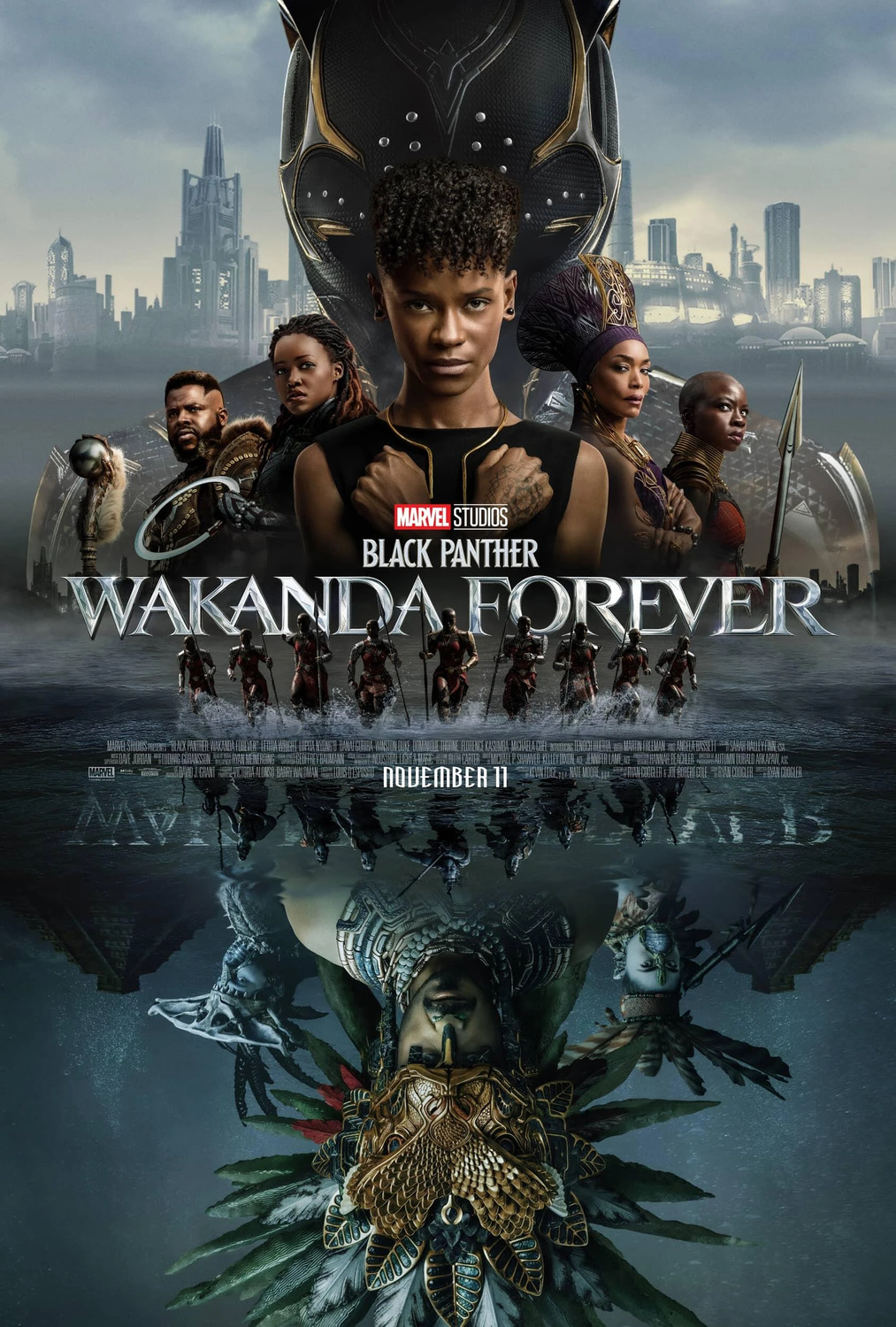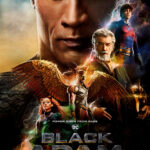Director
Ryan Coogler
Starring
Letitia Wright
Tenoch Huerta Mejía
Angela Bassett
Years after the events of Black Panther and Avengers: Endgame, King T’Challa contracts an unnamed disease and dies. This sends the entire nation of Wakanda into a state of turmoil as, with their king and protector now gone, other countries believe the isolationist nation’s vibranium could be up for pillaging. The princess, Shuri [Wright] blames herself for not being able to find a cure to save her brother and has been unable to synthesise the heart-shaped herb that gave the line of Black Panthers their powers. Meanwhile, the CIA have been using a vibranium detecting device but, in finding a vein of the precious mineral, are attacked by underwater beings. The leader of this nation, Namor [Huerta Mejía], approaches the Wakandans and blames them for this worldwide hunt for vibranium. Namor offers an ultimatum: locate and hand over the scientist responsible for this technology, or he will wage war on Wakanda.
Before we go further with this review, we need to address the elephant in the room. Black Panther was a very well made and incredibly important movie. In terms of representation, critical acclaim and box office, it stood out as something of note. To do a sequel was always going to be a challenging task. But with the death of Chadwick Boseman, that unenviable task felt almost impossible. On top of that, we have to remember that this isn’t just a standalone Black Panther sequel, it’s an MCU chapter with several franchise veins running throughout. Meaning this is a Black Panther mantle transition story, a Namor origin story, a Riri Williams origin story and a larger world-building power dynamic shift. So regardless of the final result, the fact we got a film that wasn’t an absolute mess, is a minor miracle and testament to Coogler and his crew.
From the very outset, Wakanda Forever continues the legacy of its predecessor. The frank discussions about the atrocities of the past, leading to resentment, bitterness and distrust in the present are still just as pertinent. But whereas we previously explored the notion of an advanced African kingdom untouched by colonialism, and the betrayal and abandonment felt by African Americans (namely through the character Killmonger), here we are introduced to a sister nation. Another ancient and powerful culture brought low by European conquest, only this time one that exists near the bottom of the ocean, with its roots in Mayan Mexico. Which means the real crux of the story is about the politics of these two withdrawn peoples and the enigmatic individuals that lead them. And this kindred duality is the film’s greatest strength, being both engaging and fascinating to explore. One specific way this manifests is through Ludwig Göransson’s score. Much like his previous Oscar winning effort, there’s a distinct presence of traditional African rhythms and instruments, as well as the inclusion of Mexican beats and haunting vocals – not to mention a touch of epic monster movie motifs.
Namor is one of Marvel’s oldest creations and giving him a Mexican attachment is frankly genius. Not only because it separates the classic European view of Atlantis, but because it taps into richly diverse potential. Casting, design, language, all of it coming together to create a vibrant and unique new interpretation. As well as introducing us to a capable and persuasive adversary, who has a lived and understandable lack of trust with not only outside nations, but all surface-dwelling humans. And making Namor a very confident and forthright individual, but not one that feels completely murder-happy and unreasonable, adds a level of complexity to the character. Meaning, he’s not just a disposable villain but a more inscrutable and unpredictable force. Hero? Ally? Villain? These things remain unclear.
But the main character and central focus is Shuri. Given the comic’s narrative progression, the story was likely always going down this road but was hastily brought forward by real life tragedy. Thankfully, Shuri isn’t just T’Challa 2.0. Her scientific mind, general disdain for antiquated traditions and impetuousness make her stand apart. And in one particular scene, it’s made clear that there is a darkness and raw emotional core to the princess which could easily cloud her judgement and actions.
Despite the Herculean effort to animate this behemoth, in a way that is both entertaining and meaningful, it’s far from perfect. For every positive element, there are restraints and frustrations that hold it back. Much like The Batman, I really appreciated the down-to-earth human moments and the film’s understanding that the heartfelt exchanges resonate better over the need for CGI spectacle all the time. That being said, it’s clearly a struggle to find time for every single narrative thread. And subsequently, the first hour feels oddly languid in its pacing. What’s more, as much as I can laude praise and extol the virtues of how Namor is handled and portrayed, I wanted more development of the nation and people of Talokan. From a design perspective alone, too much of it was wreathed in shadow. I get wanting to feel grounded but Aquaman showed us you don’t need photorealistic, deep sea darkness, you can have bioluminescent playfulness and beauty. As it stands, we only get a glimpse of something more impressive which robs the overall movie of a satisfying sense of scale.
But one thing we can all arguably agree on is that the inclusion of Dominique Thorne as Riri Williams and the whole Martin Freeman, Julia Louis-Dreyfus stuff was too much. It wasn’t necessarily bad, it simply detracted from the superior conflict and felt like clumsy bread-crumbing. Am I looking forward to her future involvement in the MCU? Of course. But when you have characters like Okoye [Danai Gurira] and Nakia [Lupita Nyong’o] feeling underdeveloped, it illustrates where attention was needed but lacking thanks to franchise constraints.
Yet despite all these misgivings, Black Panther: Wakanda Forever, is still good cinema. It pales compared to the finest Marvel films but when held up against rival big blockbuster releases, it serves up superior stellar entertainment.
Release Date:
11 November 2022
The Scene To Look Out For:
**spoilers**
The assignment to apprehend the scientist responsible for creating the vibranium detecting device should have been fairly straightforward. Unfortunately, it goes badly and both Shuri and Riri are taken to Talokan. For this, Okoye is stripped of her rank and privileges by Queen Ramonda [Bassett]. I understand why this happened and the allusion to the events in the first film (where the Queen had to abscond following the coup where the Dora Milaje sided with Killmonger) adds to the under-riding acerbity. But it was a plot point which felt like it ended on a sour note. There wasn’t a satisfactory level of closure and Okoye becoming one of the Midnight Angels didn’t sit right and came off a little throwaway.
Notable Characters:
Angela Bassett has been a strong presence in these movies but here she is truly commanding. Dominant, determined and energetic, in a way that is wholly captivating.
Highlighted Quote:
“My professor said I could never do it – to be young, gifted and black though, right?”
In A Few Words:
“A thoroughly competent if crammed feature.”
Total Score: 4/5

![The Red Right Hand Movie Reviews [Matthew Stogdon]](https://reviews.theredrighthand.co.uk/wp-content/uploads/2021/12/cropped-header1.png)



